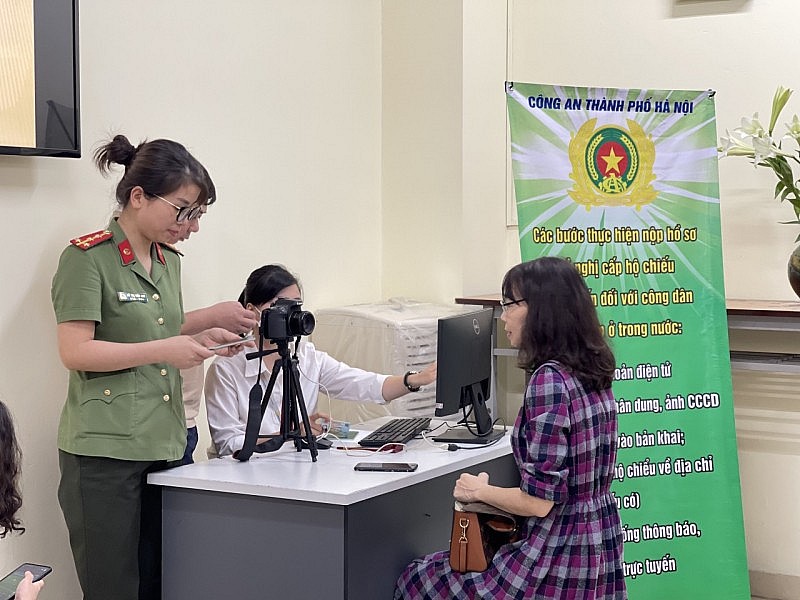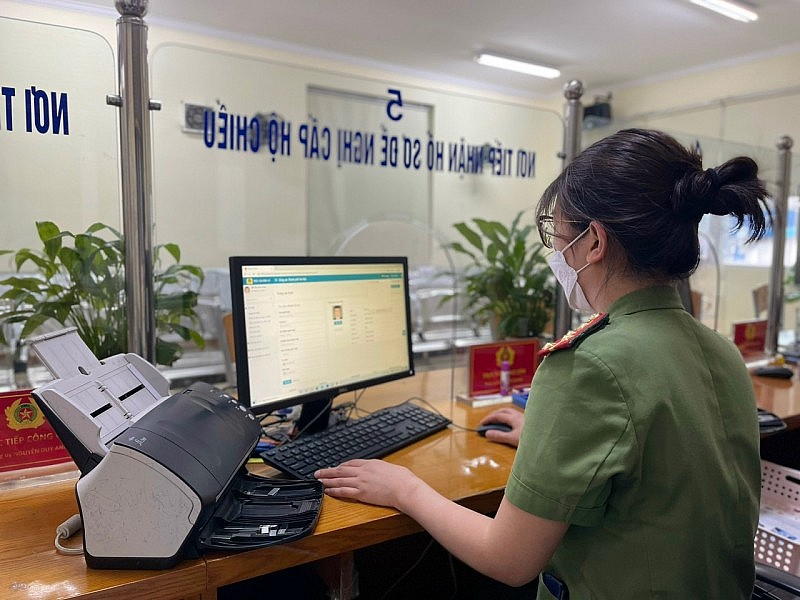 |
| Immigration Management Division of the Ha Noi Police Department carries out procedures for issuing electronic passports to citizens. Photo: cand.com.vn |
Since Vietnam reopened its borders last March, Vietnam’s visa policy has been more open, administrative procedures have been strongly reformed and renewed.
The number of foreigners entering and leaving the country after the Covid-19 pandemic has continuously increased; e-visa policy is operating stably and achieving good results.
Visa procedures are increasingly simple, fast, open and transparent with many forms. The unilateral policy of visa exemption for citizens of 13 countries (regardless of entry purposes) has created favorable conditions for foreigners to enter Vietnam for tourism, investment, business and labor.
This can be considered an important solution to create a breakthrough for Vietnam’s tourism, contributing to the effective implementation of the policy of international integration of the Party and State.
The issuance of e-visas for foreigners has been piloted since July 1, 2017 and is regulated in Law No. 51/2014/QH14.
The e-visa is valid for 30 days. Compared with the traditional visa procedure, the e-visa procedure is simpler, more convenient for foreigners, and fast (in 3 working days).
Foreigners register completely through the website for Vietnam’s e-Visa Application, not through agencies or organizations.
This is an administrative procedure carried out according to the online public service at level 4, ensuring the requirements of administrative procedure reform with the motto of publicity, transparency, convenience, cost reduction, time saving.
 |
| Immigration Management Division of the Ha Noi Police Department carries out procedures related to the management of exit and entry. Photo: cand.com.vn |
Previously, according to the provisions of Law No. 47/2014/QH13, the time for foreigners to enter Vietnam under unilateral visa exemption must be at least 30 days from the time of last exit from Vietnam.
On March 15, 2022, the Prime Minister issued Resolution No. 32/NQ-CP. The Resolution stipulates that citizens of 13 countries are exempted from visas to enter Vietnam for a period of 15 days, regardless of purpose, without requiring the time to re-enter Vietnam at least 30 days from the time of last exit from Vietnam.
This is to create favorable conditions for international tourists to enter the country on a visa-free basis, then exit to a third country and then return to Vietnam to continue traveling or return home.
Foreigners wishing to enter Vietnam for tourism purposes will contact international travel agencies to be guaranteed for visa issuance.
International travel agencies established under Vietnamese law and licensed by the Vietnam National Administration of Tourism can carry out procedures to guarantee foreigners entering Vietnam to visit and travel under their programs.
The processing time is quick, no more than 3 working days if the applicant receives the visa at the international border gate; no more than 5 working days if receiving visas at Vietnamese diplomatic missions abroad.
According to Law No. 47/2014/QH13, the issuance of visas and temporary residence cards to foreign investors only stipulates one type with the symbol DT with a period of 5 years.
Currently, according to Law No. 51/2014/QH14, the issuance of visas and temporary residence cards to foreign investors is regulated on the basis of contributed capital or industry, profession or location.
Accordingly, investors with a contributed capital of VND3 billion (US$124,559) will only be granted a visa for no more than 1 year; Investors with capital contribution of VND100 billion (US$ 4.15 million) or more will be granted temporary residence cards for up to 10 years.
This regulation has created favorable conditions for foreigners to invest in Vietnam with a large capital contribution. It also overcomes the situation of taking advantage of small capital contributions to legitimize a long-term stay in Vietnam.
Compared to many countries in the world, Vietnam’s visa policy is simple and fast, with a variety of forms according to the needs of foreigners when entering Vietnam.
Under the guidance of the Central Public Security Party Committee, leaders of the Ministry of Public Security continued to implement the visa policy in accordance with the law on entry, exit, transit and residence of foreigners in Vietnam.








